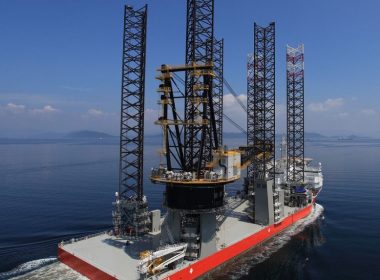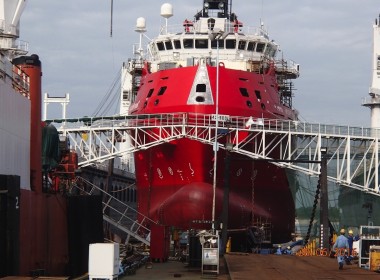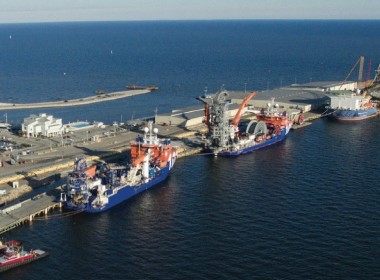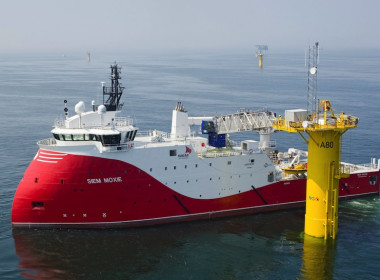COLUMN | On the edge? McDermott, Petrofac, The Metals Company and Cadeler [Offshore Accounts]

Lady Gaga famously sang that she was “on the edge of glory”. This week, we look at four companies on the edge of….well, something.
Let’s check in on two construction companies, a subsea mining venture, and our favourite wind turbine installer.
McDermott on the edge
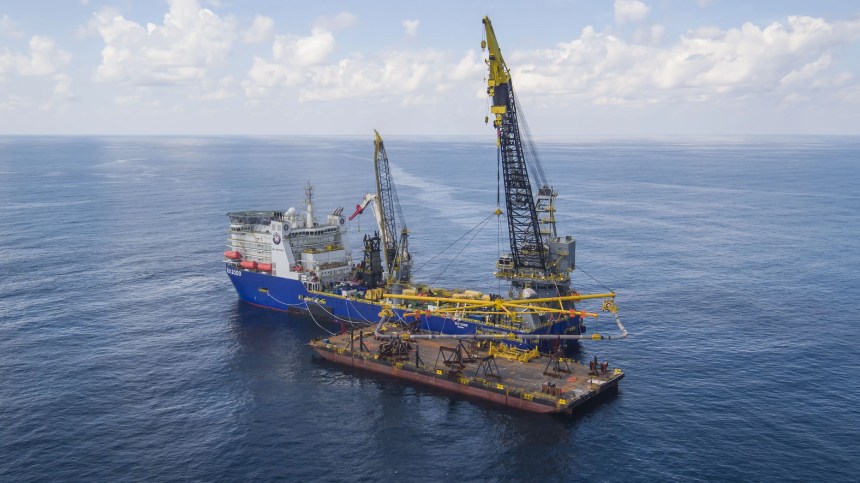
Finally, a judge in the UK has confirmed what we had long suspected – that offshore contracting giant McDermott was on the edge of bankruptcy when it was forced to give a 20 per cent shareholding to the Colombian state oil company Ecopetrol to settle an arbitration award relating to a botched refinery project in February.
The financial insolvency press in the UK gave a great deal of coverage to the McDermott restructuring case, because of the precedents the case set for other re-organisations (here, here and here). However, the details largely slipped past the energy and shipping journalists until last week, when Iain Esau drew attention to some of the key elements in Upstream.
The most important revelation was that Ecopetrol’s Refincar subsidiary had been arguing for the liquidation of McDermott and the sale of its different divisions in an orderly manner to settle the US$1.3 billion arbitration claim that Refincar had won in 2023. Refincar only accepted the 20 per cent stake in McDermott because the English judge compelled it to. McDermott had attempted to restructure its debts in order to pay Ecopetrol fractions of cents on the dollar as an unsecured creditor, which the Colombians steadfastly resisted.
The case also revealed that McDermott had been hit by a hitherto undisclosed cyber attack in April 2023, disabling many of the company’s key systems for several weeks. McDermott thus joins Bourbon, Maersk, and Swire Pacific Offshore as shipping and offshore companies hit by hackers.
Most private companies keep such attacks secret, so we must assume that they are more common than thought and that maritime organisations need to remain vigilant on cyber security risks.
The price of glory restructuring
We have previously noted how financial restructurings can be very expensive. In July, 2020 we reported that McDermott had paid out more than US$250 million in restructuring fees in its initial bankruptcy case.
In February this year, Mr Justice Michael Green, the restructuring judge, wrote that he was “horrified” to discover that McDermott had spent another US$150 million on professional fees in negotiating with its secured creditors and putting forward the second restructuring plan. He felt that this did not seem a worthwhile use of the beleaguered company’s funds.
We agree. McDermott has too long been a carcass upon which professional services and investment banking vultures have feasted with outsize fees, whilst the business itself struggles, suppliers are paid late, and ordinary employees are squeezed.
Morally this sucks, but unfortunately, it seems to be the private equity way of doing business.
The defence of “It’s in the budget”
McDermott attempted to defend itself when challenged on the issue by Mr Esau.
“This was anticipated and planned for and will not have any unplanned-for impact on our financial results,” the company’s spokesperson told Upstream. “The number used was a forecast estimate for 2023 and 2024 and estimates were accounted for in McDermott’s normal budgeting and forecasting.”
So, as long as something appears in the company budget, that is okay, then? Am I alone in thinking that a company that pays out over US$400 million in two restructurings in less than five years – and is still facing an existential threat from a US$500 million arbitration claim from BP over contract performance issues in the GTA project in Senegal – probably deserves to be put out of its misery?
Until the BP arbitration is resolved, McDermott is in limbo, and Ecopetrol is trapped as a shareholder. And vessel owners chartering ships to McDermott face some decisions on payment terms.
Petrofac: Also on the edge of restructuring
A month ago, we highlighted the parlous condition listed UK engineering and offshore maintenance company Petrofac found itself in. On April 12, the company’s share price plunged 26 per cent after it put out a press release confirming that the most likely solution to its woes is a debt-for-equity swap with its creditors:
“[Petrofac] has engaged and remains in discussions with its lenders to restructure its debt, which would result in a significant proportion of the debt being exchanged for equity in the business. It also continues to be in discussion with prospective investors and certain major shareholders in relation to potential further investment in the company and remains in negotiations with prospective purchasers regarding the sale of non-core assets, as set out in recent announcements. All options remain under consideration.”
Petrofac’s shareholders have to accept that they are on the edge of wipe-out. The company has an US$8 billion backlog of contracts, but without a resolution of its debt issues, customers may well shy away, as McDermott’s own customers did in 2023.
Petrofac: On the edge of Equatorial Guinean success
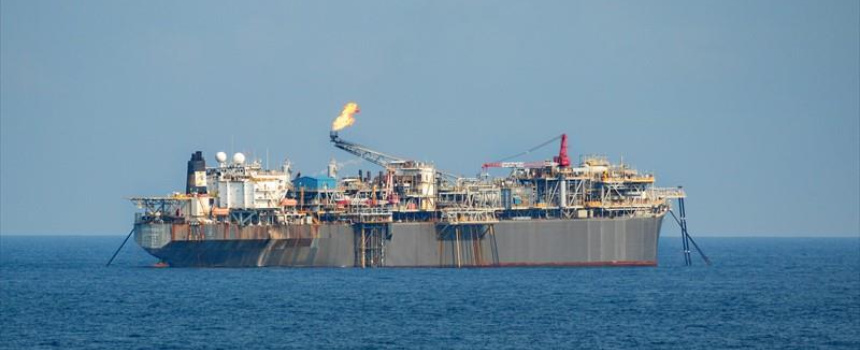
A few days later, the troubled company announced another contract win, this time in Equatorial Guinea, where it will take over the management of Block B, on behalf of the state energy company GEPetrol.
Block B is in the process of being relinquished by ExxonMobil, after years of declining production and lack of investment in maintenance. This saw the floating production unit Zafiro Producer spring an embarrassing leak, shut in production, and be untimely scrapped in Turkey in 2023 aboard a Boskalis heavy lift vessel. The handover of the block from ExxonMobil to GEPetrol will be on June 1.
Now only the aging FPSO Serpentina remains producing on location. Petrofac says that the contract is valued at around US$350 million over five years, and that it will “deliver technical services across onshore support bases, an FPSO and a platform on behalf of GEPetrol…. Valuing local capability, staff and contractors that were previously in place will continue in various roles, retaining valuable expertise and knowledge of the assets. Petrofac will manage the contract from Malabo, supplementing support from its technical hub in Aberdeen, UK, sharing its extensive Duty Holder expertise.”
Managing decaying and under invested assets requires considerable skill and care, as we have seen in Gabon where Perenco’s inability of manage its legacy fields recently resulted in the tragic and unnecessary deaths of six of its staff offshore in an explosion, and in Mexico, where shambolic and lethal Pemex consistently suffers fires, death and destruction.
Prisoners on the edge of release? We hope so
Unfortunately, I can’t imagine that many of Petrofac’s staff from its technical hub in Aberdeen will be rushing to Malabo. We highlight again the sad case of Equatorial Guinea’s despotic government using foreign nationals as human hostages.
It is fourteen months since Frederik (Frik) Potgieter and Peter Huxham, two South African offshore crew working for SBM on ExxonMobil’s facilities in Equatorial Guinea, were jailed in Malabo on what appear to be fabricated and absurd charges, as we highlighted in our coverage.
The pair were held as part of a diplomatic row with South Africa over a court case by another South African national alleging torture by the government of Equatorial Guinea. He had the temerity to win damages in court in Cape Town for his ill-treatment and he tried to arrest the yacht used by the son of the president of Equatorial Guinea, Teddy Nguema. Mr Ngeuma is also the vice president in Equatorial Guinea, with a luxury lifestyle and a large following on Instagram.
We once again call for their release. It is disgraceful that governments continue to treat seafarers and offshore workers as pawns in their political battles.
Petrofac staff should be aware of the case and act accordingly. The government of Equatorial Guinea should do the right thing and set them free.
Be the bigger and better person, Mr Nguema.
The Metals Company: On the edge of commercial production?
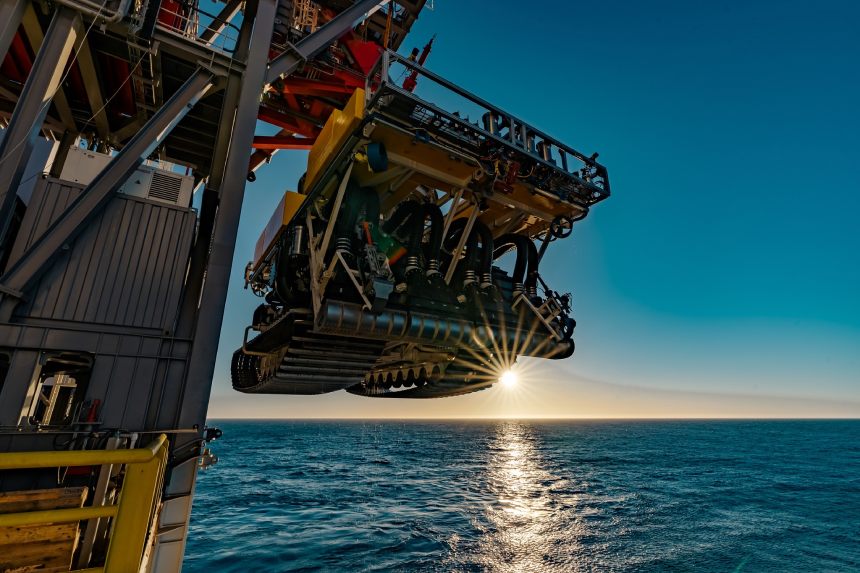
It has been a while since we last covered The Metals Company, the subsea mining company with a swathe of licences covering the Clarion-Clipperton Zone of the deepwater Pacific Ocean abysall plain, which is littered with polymetallic nodules ripe for collection and smelting. We last checked in with CEO Gerard Barron and his merry miners in July last year, when the International Seabed Authority (ISA) had failed to agree a code of practice for the subsea mining industry.
Last month, The Metals Company published its 2023 full year results. It reported another full-year net loss of US$73.8 million, down from the US$122 million it lost in 2022. The miner has no revenues, still being in the exploration phase.
On December 31, the company reported a cash balance of just US$6.8 million, although in January it raised another US$9 million from shareholders. The shares are surprisingly robust, closing at US$1.61 on Friday, a long way from the lows of US$0.55 plumbed in December 2022, but still a long way from the US$10 price at which the company listed in 2021.
Additionally, The Metals Company has access to an undrawn US$25 million unsecured credit facility from the Allseas Group, the Swiss-Dutch construction group which owns and operates Hidden Gem, the converted deepwater drillship used for harvesting the nodules from the seabed. The maturity date of this credit line has been extended through August 2025.
An additional US$20 million unsecured credit facility with a maturity date in September 2025 has been provided by the largest shareholder, in The Metals Company, ERAS Capital (the family office of TMC director Andrei Karkar), and by the company’s Chairman and CEO, Gerard Barron.
It must be reassuring for shareholders to see the company’s CEO offering to loan the company his own money to stave off a cash crisis. If it did go bankrupt, what might happen then?
Planning for production in 2026
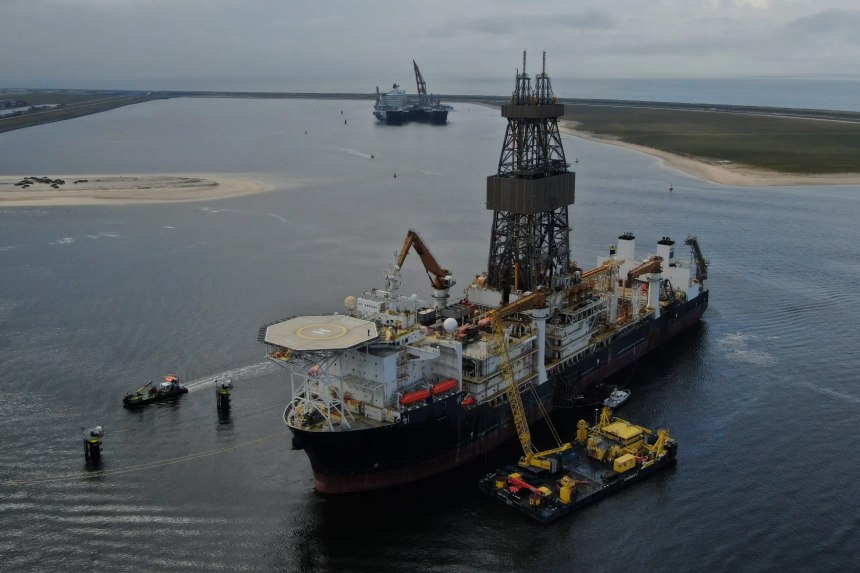
Rather like McDermott and Petrofac, The Metals Company is in limbo.
It is in the process of submitting the Environmental Impact Statement for its first commercial operations to the ISA. It plans to submit a request for its first commercial exploitation contract for NORI Area D following the July 2024 meeting of the ISA. Mr Barron now expects the company to commence production offshore at the end of the first quarter of 2026, assuming an ISA review process of approximately one year from the submission of the application.
This suggests to me that those lines of credit will need to be extended for another year until mid-2026 to bridge the gap until the company is gathering nodules and making money, assuming that the environmental damage its operations will inflict are deemed acceptable by the ISA.
Ahead of the green light to commence industrial scale vacuuming, the company is in discussions with Allseas to upgrade Hidden Gem, including installing an additional nodule collector vehicle on board. This will increase the maximum annual production capacity of the ship from 1.3 million wet tonnes to 3.0 million wet tonnes of nodules.
The company says that it will be “carefully ramping-up production in manageable increments over a five-year period based on precautionary principles.”
The Metals Company believes that the NORI Area D concession is worth US$8 billion.
On the edge of a race to plunder the abyssal plain?
As expected, the start of commercial production of polymetallic nodules is likely to kickstart a race to plunder this little understood and remote area of the world’s oceans. Even if nickel prices have dropped from their 2023 peaks, demand for battery metals for Teslas and the like are forecast to surge. More countries and companies want a piece of the action.
In January 2024, the Government of India submitted two applications to the ISA for approval of two plans of work for exploration in the international seabed area of the Indian Ocean. The Government of India already holds two contracts for exploration—one for polymetallic sulphides in the Central Indian Ocean Basin and another for polymetallic nodules in the Indian Ocean Ridge.
We can expect Russia, China, and Norway to also pile in. The deepwater abyssal plain is now an area of competition for the world’s powers. We can expect the unique and rare deepwater species that live there to come a poor second to superpower greed and a resource rush for metals.
America on the edge of joining the ISA after ratifying UNCLOS?
These moves have led to a rush of interest in the United States to join the ISA.
Earlier in the year, former Secretary of State Hillary Clinton and former Secretary of Defense Leon Panetta called upon American Senators to ratify the Law of the Sea Treaty (UNCLOS), so that the US “can take its seat on the council of the International Seabed Authority,” and pursue deep sea mining sites “each containing a trillion dollars in value,” The Metals Company highlighted in its results announcement.
I am not sure Mrs Clinton is an especially compelling advocate for seabed mining, but what do I know?
The company has been lobbying hard that collecting nodules is in the national security interests of the United States. Last month, legislation was introduced in the US House of Representatives calling for the USA to “support international governance of seafloor resource exploration and responsible polymetallic nodule collection by allied partners,” and to “provide financial, diplomatic, or other forms of support for seafloor nodule collection, processing and refining.”
Rather than attempting to slow down the rush to grab seabed riches, the US now seems set on grabbing a share of the pie for itself.
The environmental picture suggests that this is a bad idea.
On the edge of irrevocable harm?
Unfortunately, in February, the Pulitzer Centre ran a detailed piece examining the long-term impact of previous deepwater seabed mining trials in the Atlantic in 1970, written by Clare Fieseler. It concluded that fifty years on, there had been no recovery of the ecosystem on the seabed where the earlier mining trial had occurred:
“Only through methodically piecing together a “complete picture” did [the researcher] realise how little the area had recovered since that giant vacuum removed nodules a half-century ago. The areas between the long, straight tracks had no nodules, no sponges, and no fish – just wavy lines of sand. Outside the tracks lay giant fields of nodules, mottled, encrusted — tiny cities resting atop a geological buckshot of debris.
“It looked like they were there yesterday,” he said, referring to the 1970 seabed miners’ impact on the environment.
In short, we are on the edge of a habitat destruction in an area previously pristine and protected. Don’t expect Mr Barron or the ISA to highlight this any time soon, however.
Cadeler: On the edge of a decade of zero pay rises?
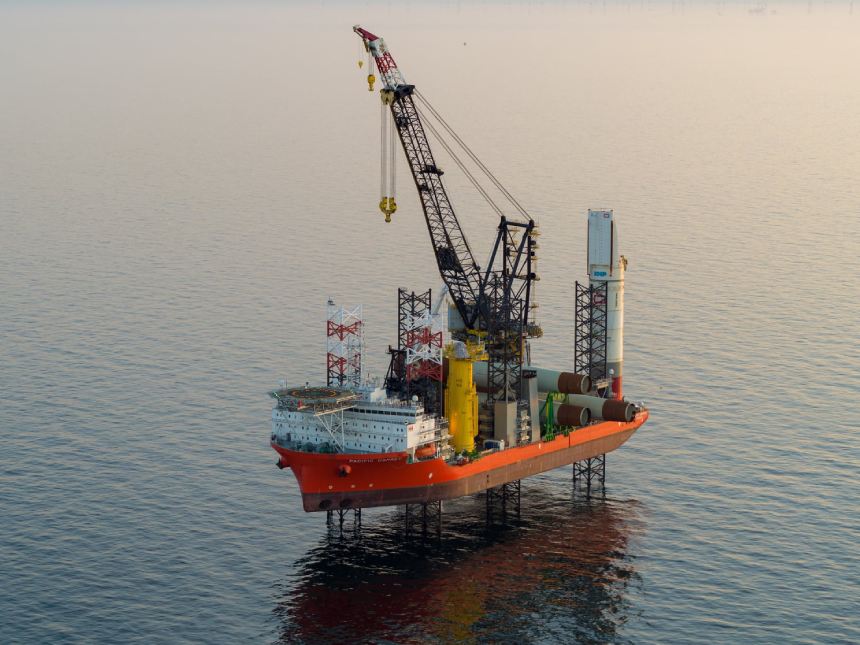
Some years ago, we wrote that we hoped that Clarkson, the world’s largest and most ubiquitous shipbroker and shipping financial services company, might finally have reached peak. This was possibly in the print era, so nobody can see how badly wrong we were. Over the last five years, Clarkson shares went up 57 per cent.
Earlier in the month, Clarkson released a bullish report on Cadeler, the Danish wind farm giant. If you work for Cadeler, you might want to ask your management why Clarksons estimates that the operating cost of all of Cadeler’s wind turbine installation vessels (WTIVs) remains completely flat for five years for 2026 to 2030.
This of course means that Cadeler sea staff can expect no pay rises until the end of the decade. This seems delusional to us. Vessel operating costs rise consistently when markets are strong and as vessels age.
If Cadeler is going to be the success Clarkson claims, you would expect demand for skilled seafarers in the wind installation niche to be strong, with rising salaries for experienced personnel as the fleet increases. If the market is rubbish and vessels are laid up, then Cadeler will struggle and not achieve the optimistic goals it claims.
Either way, Clarksons will be wrong and something will have to give.
Background Reading
Nepo babies in shipping are nothing new. Writing in The Guardian on the extensive number of second-generation pop stars benefiting from their parents’ fame, Simon Price has provided inspiration for a future piece here. If you are a victim of egregious nepotism in shipping, drop us a line via [email protected]. If you are a nepo baby, share your tales of personal suffering for family glory.
Where did Teddy Ngeuma get the very camp, disco-decorated jet in which he arrived in Moscow in this video? Flying to see President Putin in a plane painted like a psychedelic 1970s album cover is quite a thing. Careful, Teddy. Prince Jefri of Brunei will be jealous!
You can read the full transcript of The Metals Company’s results briefing here.
We have previously covered at length the conflicts of interest that surround the International Seabed Authority.
Here is background information on the long and troubled history of the USA and its efforts to ratify the United Nations Convention on the Law of the Sea. Twelve years ago, The Atlantic magazine ran a piece titled “(Almost) Everyone Agrees: The US Should Ratify the Law of the Sea Treaty”. It still hasn’t.


